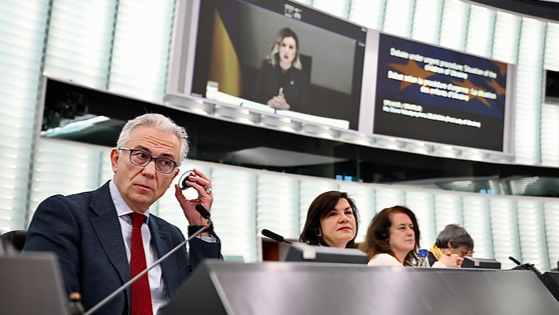Following an urgent debate on 25 January, PACE unanimously adopted a resolution based on the report by Olena Khomenko (Ukraine, EC/DA) underscoring the urgent need to address the situation and fate of Ukrainian children forcibly transferred and deported to the temporarily occupied territories of Ukraine, the Russian Federation, and Belarus. As of today, the Ukrainian Government's “Children of War” platform has collected information on more than 19,546 children reported as deported or forcibly transferred from various locations, only 388 of whom have returned home, the resolution states. Addressing the Assembly, Ukraine’s First Lady Olena Zelenska asked national parliaments “to join in order to force Russia to comply with at least the Geneva Conventions and immediately provide comprehensive lists with the names and whereabouts of all Ukrainian children who have been illegally deported”. Every rescued child “is a special operation involving many countries and dozens of people who care. That’s how we succeed. And there are dozens of caring countries and millions of caring people in the world. At least I believe in this,” she added.
The adopted text reiterates that “all Ukrainian children have the right to enjoy the rights and freedoms enshrined in relevant international human rights instruments” and emphasised that “the best interests of the child must prevail in all decision-making processes concerning them”, reinforcing the principle that children should never be used as “a means of exerting pressure or as war trophies”.
The Assembly, therefore, called on national parliaments to adopt resolutions recognising these crimes as genocide, and the international community to collaborate with Ukraine to trace and repatriate missing children, namely “to identify, locate and return them to Ukraine”.
Expressing gratitude to Council of Europe member states that have assisted Ukrainian children, the parliamentarians called for support, urging host countries to provide essential services, including education, healthcare and mental health support, and encouraged the maintenance of connections with their language and culture to facilitate their future return to Ukraine.
They highlighted the need for increased co-operation among existing parties and mechanisms, relying in particular on third-party intervention to collaboratively work towards the return of children. They called on the various organisations whose neutrality-based mandates allows them to gain access to the territories of the Russian Federation, Belarus, and occupied territories of Ukraine “to contribute to the process of identification, location and repatriation of deported and forcibly transferred Ukrainian children and to work closely with Ukraine and all States which could facilitate the return of children”.
Finally, PACE reiterated its commitment to continuing its role as a facilitator to support the Ukrainian authorities and various international organisations in “determining the most rapid means to identify and facilitate an effective search for children” with access to as much information as possible about their identity and the conditions of their deportation or forcible transfer by the Russian Federation.
On 23 January, PACE expressed concern at the intensification of a partial and biased treatment of the issue of migration and asylum in election campaigns, which legitimises political programmes aimed at hindering migrants' access to their rights in contravention of the Council of Europe’s standards and norms.
The Assembly highlighted that this issue was accompanied by “verbal and physical attacks on people of foreign origin or perceived as such, in particular on racialised persons and members of religious minorities.” Attacks and intimidation promoters of migrants’ rights are also of concern.
Adopting a resolution, based on the report by Pierre-Alain Fridez (Switzerland, SOC), the parliamentarians put forward a series of proposals for political parties, parliaments, Council of Europe bodies, electoral administrations, the media and NGOs - including those founded by migrants, refugees and asylum seekers - to support the debate on this theme, in keeping with the principles of freedom of expression.
The Assembly underscored that the theme of migration and asylum cannot be limited to security matters and called politicians and the media to weigh the consequences such restricted views may bring to social cohesion and public order.
It called for amendments to electoral laws, recognising electoral management bodies as “monitoring bodies empowered to seize the competent authority in case of hate speech by a candidate during an electoral campaign.”
The resolution recommends self-regulation but also more robust and binding instruments against hate speech, endorses the Charter of European political parties for a non-racist and inclusive society and commends the intergovernmental decisions on combatting hate speech adopted by the Committee of Ministers in May 2022.
In a broader context, the Assembly calls for reinforced pan-European cooperation on this issue involving key partners such as the Fundamental Rights Agency of the European Union, the European Network of National Human Rights Institutions, the European Network of Equality Bodies, and the OSCE/ODIHR.
Other proposals include the formalisation of collaboration among Council of Europe bodies to examine the handling of migration and asylum issues within electoral campaigns.
“By supporting the efforts undertaken by the Belarus democratic forces and civil society, we enrich our own European identity” stated Paul Galles (Luxembourg, PPE/CD), rapporteur on “Addressing the specific challenges faced by the Belarusians in exile” at the “Helsinki dialogue – a democratic future for Belarus”, held in Helsinki on 11 and 12 January 2024.
Taking part in the panel devoted to “Belarusian national identity: culture, history and language”, Paul Galles recalled that one of the important consequences of the struggle for democracy after the rigged elections of 2020 had been the revival of Belarusian identity. He underlined that while the political crisis born after the elections has led to a renaissance of the interest for Belarusian language and culture among Belarusians in exile, it has been repressed in Belarus itself. Thus, many artists and writers who joined the mass protests after the elections were detained on administrative charges or criminally prosecuted. Mr Galles also noted with concern that the regime had censored and prohibited the publishing of specific books considered as extremists, such as those of Sviatlana Alexievich, Nobel Laureate for literature.
Noting that Belarus was probably the only country in the world which denies its own national identity, Paul Galles regretted that, today, effectively, the defence of the Belarusian language and culture could be undertaken from abroad only, as it led to prison in Belarus itself.
The need to have all names and terms correctly transliterated from the Belarusian language, the necessary support to be provided to the democratic forces of Belarus and to civil society initiatives, the encouragement to facilitate the creation of publishing houses in Belarusian, the teaching of Belarusian language and culture in universities, the development of new tools supporting the dissemination of Belarusian language and culture among those in exile but also within Belarus are some of the highlights of the recommendations formulated by Paul Galles in his report.
Paul Galles also encouraged the introduction of the Belarusian language in Duolingo and in the Council of Europe itself, while underlying that nurturing one’s own identity and language did not mean being closed to others or making tabula rasa of past influences. Growing strong roots, which allow to know where ones belongs, enables enrichment with others’ cultures.
Paul Galles concluded that “culture should not be market-driven; it cannot be translated into figures on an Excel sheet. It is crucial that support is given to allow theatre troops to perform their plays, musicians to play, books to be published and read, so that art becomes the cement of Belarusian identity, and that Belarusian language and culture again find their place in the sun, as they are key to Belarusian statehood”.
The “Helsinki dialogue” was jointly organised by the Parliamentary Assembly of the Council of Europe (PACE) and the Parliament of Finland.




